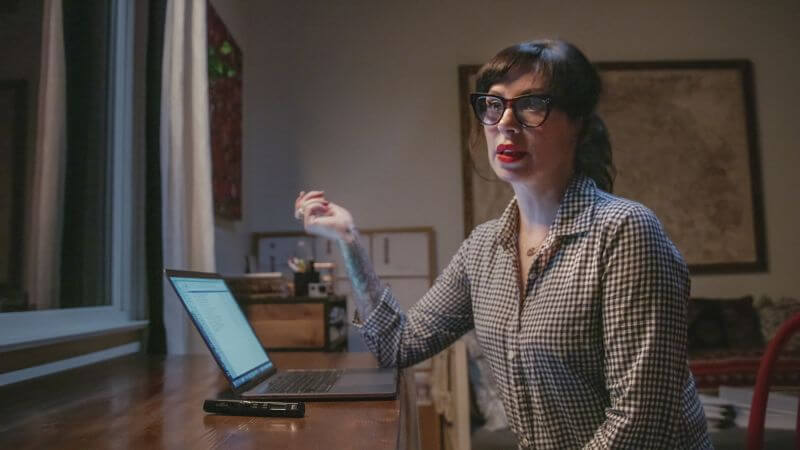Journalist and author Jillian Lauren serves as narrator and guide into the horrifying tale. Lauren and Little formed a Silence Of The Lambs-esque bond in 2018, when she reached out to him for an interview for her book while he was imprisoned. He ended up confessing his crimes to her, and Confronting A Serial Killer includes audio footage of her interactions with him.
The docuseries is directed by Joe Berlinger, the filmmaker behind Paradise Lost: The Child Murders At Robin Hood Hills and Conversations With A Killer: The Ted Bundy Tapes. Berlinger doesn’t focus solely on figuring out Little’s nauseating psyche; he uses Lauren and her life story to anchor the episodes. As she establishes a connection with Little and deftly gets him to open up, Lauren gets honest about her former substance abuse, an abusive ex, and her time as a sex worker. Her past has provided her with a deep empathy for and a commendable drive to help solve cold cases pertaining to Little’s crimes (she detailed these past experiences in her 2010 memoir, Some Girls: My Life In A Harem).
Confronting A Serial Killer also turns to FBI detectives like Mitzi Roberts, who helped Lauren gather information from Little on his murders. Since she attained his trust and offered to listen in what she calls a “deal with the Devil,” Lauren must sit through numerous menacing conversations with the serial killer. Little’s gravelly voice is scary on its own, but his soulless confessions, displayed on-screen through text and moody footage, are bloodcurdling. Lauren endured his presence for over two years before his death in December 2020—even though he was the one behind bars, the journalist was almost his captive. The docuseries does a commendable job of showing how Lauren’s commitment to the case put an emotional burden on her personal life, and why she persevered with their support of her husband (Weezer bassist Scott Shriner) and two kids.
One of the most egregious takeaways, though, is that Little was able to commit almost a hundred murders because he knew his victims wouldn’t be taken seriously. He purposefully targeted many Black women belonging to low-income families, taking advantage of their need for money. To Little, they were already overlooked by their loved ones and the law. He traveled across the country and disposed of these women with the presumption that no one would miss them. Confronting A Serial Killer works to expose how the clear racial and socioeconomic bias of the time, along with a lack of technological and scientific advancement like DNA testing, made it easy for Little to evade arrest.
The docuseries features interviews with family members of the victims who made concerted efforts to locate them and didn’t get much help from the police. On multiple occasions, Little was caught by police officers, but despite a lengthy rap sheet, lack of evidence meant he was back on the streets in no time. Even testimonies from his surviving victims, who painstakingly describe how he strangled them—an M.O. that matched similar previous crimes—didn’t help. In the minds of investigators, the victims’ backgrounds or race undermined their credibility, and often meant they were scrutinized more than Little. It’s appalling to realize that many women’s lives would have been saved if the system wasn’t rigged against them—and that Little, and likely others like him, knew how to exploit it.
While all five episodes are strong and opt for more straightforward storytelling, the format can get repetitive. Lauren’s dealings with Little are remarkably brave, but she often threads the same thoughts in each episode about why she wants to learn how he could commit such abhorrent violence toward women. This motivation is solidified early on, so going over it repeatedly doesn’t add anything. Visually and tonally, the series’ reenactments and stock footage match some of Little’s descriptions, but they can also offset the severity of what he is saying. Confronting A Serial Killer works best when it presents the unvarnished truth. It doesn’t need anything flashy to keep it going. But these drawbacks are relatively minor; the series makes a notable attempt to bring this case to the forefront without propping up the notorious criminal responsible, instead finding a way to honor the legacy of those who lost their lives.






















![Rob Reiner's son booked for murder amid homicide investigation [Updated]](https://img.pastemagazine.com/wp-content/avuploads/2025/12/15131025/MixCollage-15-Dec-2025-01-10-PM-9121.jpg)


















